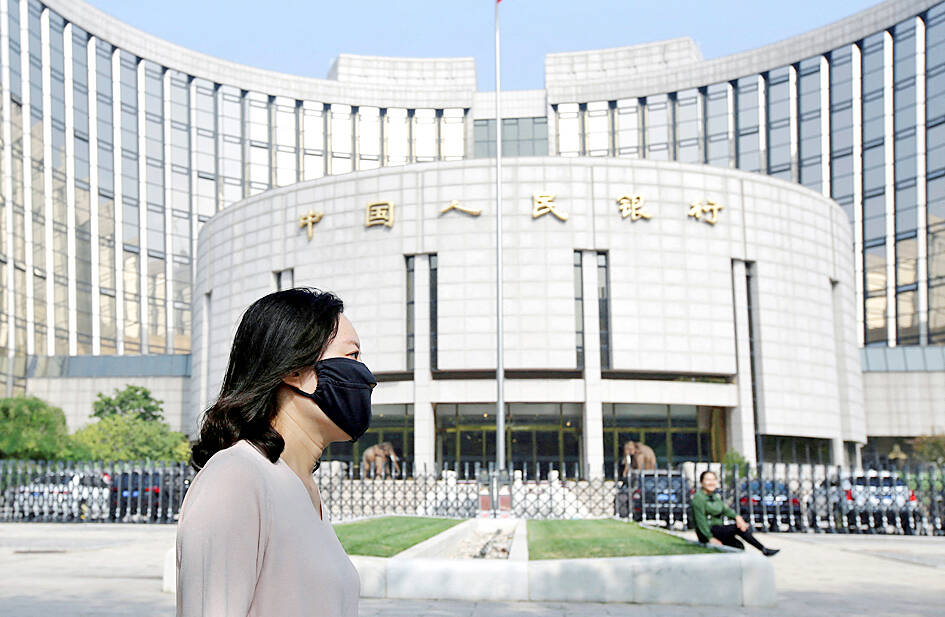China’s central bank has outlined a “moderately loose” monetary plan aimed at boosting domestic demand to spur growth, days after Chinese President Xi Jinping (習近平) called for more proactive macroeconomic policies.
Beijing last year struggled to lift the economy out of a slump fuelled by a property market crisis, weak consumption and soaring government debt.
Officials have unveiled measures aimed at bolstering growth, including cutting interest rates and easing homebuying restrictions, but economists have warned more direct stimulus might still be needed.

Photo: Reuters
The People’s Bank of China (PBOC) said in a statement on Saturday that it would “implement a moderately loose monetary policy ... to create a good monetary and financial environment for promoting sustained economic recovery.”
The statement reiterated plans to cut interest rates and the reserve requirement ratio, which dictates how much banks must hold in their coffers, rather than lending or investing.
It said the changes would be made “at an appropriate time” depending on conditions at home and abroad.
The PBOC emphasised the need to weed out corruption — signalling the continuation of a long-running crackdown in China’s finance industry.
It also said it would continue to help local governments resolve debt burdens with “financial support.” The measures are to “prevent and resolve financial risks in key areas, further deepen financial reform and high-level opening up, focus on expanding domestic demand, stabilising expectations, and stimulating vitality,” the statement said.
The bank’s announcement came after officials convened for a two-day conference in the capital.
Beijing was aiming for growth of around 5 percent for last year, a goal Xi has expressed confidence in achieving, but which many economists believe would be narrowly missed.
The IMF expects China’s economy to have grown by 4.8 percent last year and to grow by 4.5 percent this year.
Separately, the country’s foreign exchange regulator said on Saturday that it would encourage “high-quality foreign capital” to invest in China’s domestic technology sector, a statement posted on the Web site of the State Administration of Foreign Exchange said.
The government would optimize the management of overseas-traded Chinese companies’ funds and continuously improve the supervision policies governing multinational corporations’ capital, the statement added.
Additional reporting by Bloomberg

SEEKING CLARITY: Washington should not adopt measures that create uncertainties for ‘existing semiconductor investments,’ TSMC said referring to its US$165 billion in the US Taiwan Semiconductor Manufacturing Co (TSMC, 台積電) told the US that any future tariffs on Taiwanese semiconductors could reduce demand for chips and derail its pledge to increase its investment in Arizona. “New import restrictions could jeopardize current US leadership in the competitive technology industry and create uncertainties for many committed semiconductor capital projects in the US, including TSMC Arizona’s significant investment plan in Phoenix,” the chipmaker wrote in a letter to the US Department of Commerce. TSMC issued the warning in response to a solicitation for comments by the department on a possible tariff on semiconductor imports by US President Donald Trump’s

‘FAILED EXPORT CONTROLS’: Jensen Huang said that Washington should maximize the speed of AI diffusion, because not doing so would give competitors an advantage Nvidia Corp cofounder and chief executive officer Jensen Huang (黃仁勳) yesterday criticized the US government’s restrictions on exports of artificial intelligence (AI) chips to China, saying that the policy was a failure and would only spur China to accelerate AI development. The export controls gave China the spirit, motivation and government support to accelerate AI development, Huang told reporters at the Computex trade show in Taipei. The competition in China is already intense, given its strong software capabilities, extensive technology ecosystems and work efficiency, he said. “All in all, the export controls were a failure. The facts would suggest it,” he said. “The US

The government has launched a three-pronged strategy to attract local and international talent, aiming to position Taiwan as a new global hub following Nvidia Corp’s announcement that it has chosen Taipei as the site of its Taiwan headquarters. Nvidia cofounder and CEO Jensen Huang (黃仁勳) on Monday last week announced during his keynote speech at the Computex trade show in Taipei that the Nvidia Constellation, the company’s planned Taiwan headquarters, would be located in the Beitou-Shilin Technology Park (北投士林科技園區) in Taipei. Huang’s decision to establish a base in Taiwan is “primarily due to Taiwan’s talent pool and its strength in the semiconductor

French President Emmanuel Macron has expressed gratitude to Hon Hai Precision Industry Co (鴻海精密) for its plan to invest approximately 250 million euros (US$278 million) in a joint venture in France focused on the semiconductor and space industries. On his official X account on Tuesday, Macron thanked Hon Hai, also known globally as Foxconn Technology Group (富士康科技集團), for its investment projects announced at Choose France, a flagship economic summit held on Monday to attract foreign investment. In the post, Macron included a GIF displaying the national flag of the Republic of China (Taiwan), as he did for other foreign investors, including China-based